Shirley Chisholm: Breaking the White Mold
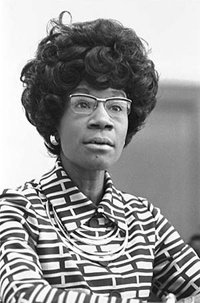 Shirley Anita St. Hill Chisholm (1924 –2005) was the first African American, and the first woman, to seek a major party nomination for president of the United States. Using her trademark slogan 'Unbought and Unbossed,' Chisholm ran for the Democratic party nomination in 1972.
Shirley Anita St. Hill Chisholm (1924 –2005) was the first African American, and the first woman, to seek a major party nomination for president of the United States. Using her trademark slogan 'Unbought and Unbossed,' Chisholm ran for the Democratic party nomination in 1972.
It wasn't the first time Chisholm had blazed a new trail. Chisholm was the first Black woman elected to Congress in 1968. She went on to represent the Bedford-Stuyvesant area of Brooklyn in New York City for seven terms, from 1969-1983.
For her first term in the U.S House of Representatives, Chisholm was assigned to the House Agriculture Committee. In an unheard of move, she demanded reassignment and was transferred to the Veterans Affairs Committee. But by the time she left the House, Chisholm was a high ranking member of two influenial committees: Rules and Education and Labor.
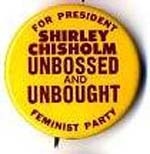 The daughter of Caribean immigrant parents, she attended Brooklyn College of the city of New York University as an undergraduate, and earned her master's from Columbia University. She was an early education teacher and director of a child care center before moving into politics.
The daughter of Caribean immigrant parents, she attended Brooklyn College of the city of New York University as an undergraduate, and earned her master's from Columbia University. She was an early education teacher and director of a child care center before moving into politics.
Chisholm helped found the Congressional Black Caucus in 1969 as one of its founding members. During her presidential run, Chisholm won 152 delegate votes, but she lost the nomination to South Dakota Sen. George McGovern. Chisholm's base of support was ethnically diverse and included the National Organization for Women.
A vocal opponent of the draft, she supported spending increases for education, health care and other social services, and reductions in military spending. Her book "Unbought and Unbossed" tells the story of her presidential campaign.
Jesse Jackson: From SCLC to World Leader
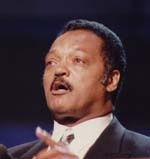 From a young age, Jackson was always a leader. In his late 20s, he directed the Southern Christian Leadership's Operation Breadbasket in Chicago and later on a national level, after being promoted by Martin Luther King Jr. After King's assassination, for which Jackson was witness, he clashed with SCLC's leadership, forcing him to form Operation PUSH in 1971. His official political life began in 1984 when he made a bid for the White House, the second African American after Shirley Chisholm to have done so. He won 18.2 percent of the national primary vote and five state contests. In 1988, the results were better. He won 11 state contests and was briefly considered the front runner before Michael Dukakis took the lead. He also served as Washington, D.C.'s "Shadow Senator" – a nonvoting position used to lobby for the District of Columbia.
From a young age, Jackson was always a leader. In his late 20s, he directed the Southern Christian Leadership's Operation Breadbasket in Chicago and later on a national level, after being promoted by Martin Luther King Jr. After King's assassination, for which Jackson was witness, he clashed with SCLC's leadership, forcing him to form Operation PUSH in 1971. His official political life began in 1984 when he made a bid for the White House, the second African American after Shirley Chisholm to have done so. He won 18.2 percent of the national primary vote and five state contests. In 1988, the results were better. He won 11 state contests and was briefly considered the front runner before Michael Dukakis took the lead. He also served as Washington, D.C.'s "Shadow Senator" – a nonvoting position used to lobby for the District of Columbia.
He is the founder of the Rainbow Coalition, which merged with Operation PUSH to create the RainbowPUSH Coalition. Jackson has been involved in numerous other civil rights activities and international areas of focus, too numerous to list.
Al Sharpton: A Controversial Preacher
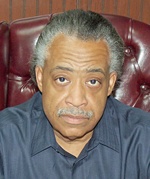 Al Sharpton in 2008? No, Rev. Sharpton is not running this year, but you can find Sharpton '08 T-shirts and buttons for sale online. The New York City-based Baptist minister and activist did run for the Democratic presidential nomination in 2004, but never received enough support to be a serious contender. He dropped out and endorsed John Kerry.
Al Sharpton in 2008? No, Rev. Sharpton is not running this year, but you can find Sharpton '08 T-shirts and buttons for sale online. The New York City-based Baptist minister and activist did run for the Democratic presidential nomination in 2004, but never received enough support to be a serious contender. He dropped out and endorsed John Kerry.
Often a controversial figure, Sharpton grew up poor after his father left his mother and lived in housing projects as a child. Yet Sharpton was drawn to the limelight. He preached his first sermon at the age of four and toured with Mahalia Jackson. He was first licensed as a Pentecostal preacher when he was 9 years old, then again as a Baptist in 1994. He worked as a tour manager for James Brown and in 1980 married backup singer Kathy Jordan.
His civil rights work has included raising money for low-income youth, protesting against police brutality and miscarriages of justice and campaigning in the African American community for gay rights. Rev. Sharpton has never won political office athough he has run for mayor of New York as well as president. Winning is not what it is all about, he says. "Maybe I ran for political office to change the debate, or to raise the social justice question."
Carol Mosely Braun: Renaissance Woman
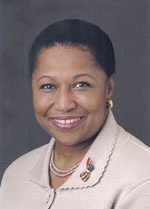 Last election cycle, in 2004, Carole Mosely Braun was hitting the campaign trail in a bid to win the Democratic presidential nomination. Now she has a new career as chief executive of her own company, Ambassador Organics. a company that specializes in organic foods from biodynamic farms.
Last election cycle, in 2004, Carole Mosely Braun was hitting the campaign trail in a bid to win the Democratic presidential nomination. Now she has a new career as chief executive of her own company, Ambassador Organics. a company that specializes in organic foods from biodynamic farms.
"Biodynamic farming is the most sustainable farming model in the world," Mosely-Braun told the online environmental magazine Grist, and we are the first company in America to market a line of biodynamic organic products."
From the start Mosely –Braun was a history maker. In 1992 she became the first African American woman elected as a U.S. Senator and only the second African American since Reconstruction to be elected as a senator. A Democrat from Illinois, she earned a law degree from the University of Chicago and worked in the U.S. Attorney's Office, where she won the Special Achievement Award. The n in 1978 she went into national politics and was elected to the Illinois House of Representatives. She was voted Best Legislator each of the 10 years she served. From 1999 – 2001 she served as U.S. Ambassador to New Zealand.
To read Grist's interview with former Sen. Carol Mosely-Braun go to www.grist.org and search for "Shake Rattle and Carol" by Amanda Griscom Little.
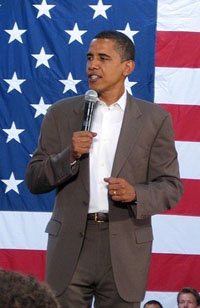 Barack Obama: A Serious White House Contender
Barack Obama: A Serious White House Contender
Obama. In less than four years since delivering the keynote address at the 2004 Democratic National Convention, he has risen from an legislator from Illinois to the most serious African American contender for president yet. Born in Honolulu, Hawaii to a Black Kenyan father and White mother from Kansas, Obama spent his early years in Indonesia and Hawaii, before returning to the lower 48 to pursue his higher education. He has worked as a community organizer in Chicago and was the first Black president of the Harvard Law Review while attending Harvard Law School. He served as an Illinois state senator from 1996 to 2004, and currently represents Illinois in the U.S. Senate.










